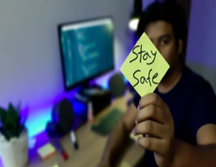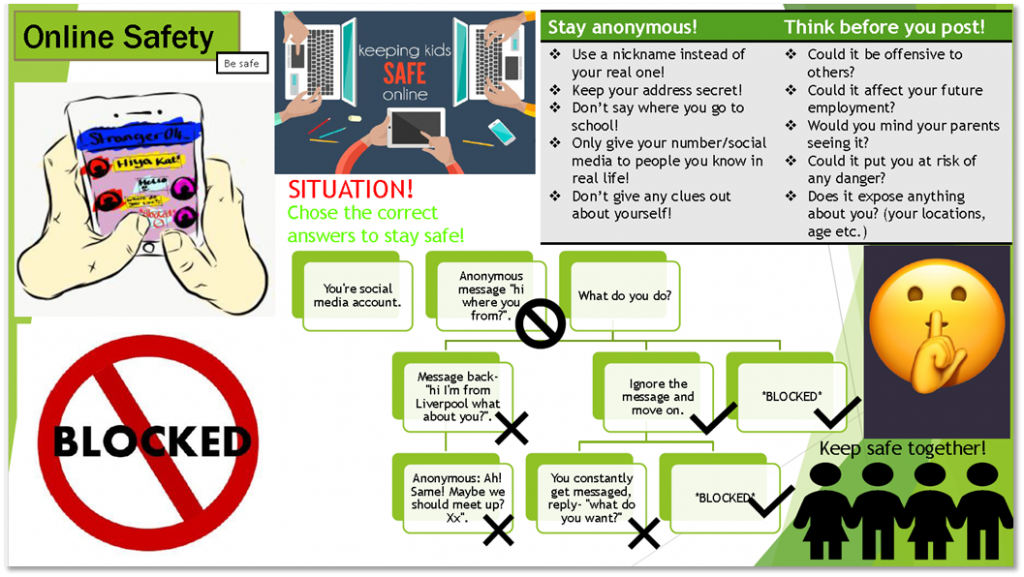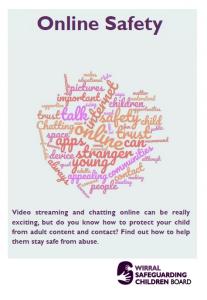Online Safety
What does it mean to be Safe Online

Almost every child and young person is now ‘connected’ to the internet via their laptops, mobile phones, tablets or personal computer. The potential for the internet to be a valuable and a fun resource for entertainment, making friends, keeping in touch and learning is huge. But if you use the internet, you could be at risk of illegal activity or abuse – be it bullying, fraud or something more serious. Unlike seeing someone face to face, on the net, people aren’t always what they first seem.
In the same way you learn about safety when you leave the house, it is important to learn how to stay safe online. These are skills that will stay with you for life.
Your Rights
Digital citizenship – Young people’s rights on social media In today’s increasingly digital world, it’s more important than ever that our young people are able to understand and feel in control of their online rights. But more often than not, they’re not even aware that they even have any.
How can we keep safe when we use the internet?
- Don’t post any personal information online – like your address, email address or mobile number
- Think carefully before posting pictures or videos of yourself. Once you’ve put a picture of yourself online most people can see it and may be able to download it, it’s not just yours anymore
- Keep your privacy settings as high as possible
- Never give out your passwords
- Don’t befriend people you don’t know
- Don’t meet up with people you’ve met online. Speak to your parent or carer about people suggesting you do
- Remember that not everyone online is who they say they are
- Think carefully about what you say before you post something online
- Respect other people’s views, even if you don’t agree with someone else’s views doesn’t mean you need to be rude
- If you see something online that makes you feel uncomfortable, unsafe or worried: leave the website, turn off your computer if you want to and tell a trusted adult immediately
An updated list of 184 gaming and social media apps commonly used by young people is available here: Social-Media-Library-April-2019. The list includes the names and description of the apps.
Social networking
Social networking websites and apps, such as Facebook, MySpace, Instagram, Viber, Tumblr, SnapChat, Ask.fm and Twitter have become incredibly popular in recent years.
- Most users are genuine, but because it is so easy to hide your real identity, it is possible to come into contact with people you would normally avoid.
Gaming
Online gaming means you can play in real time with people across the world through a computer, games console, tablet or smartphone connected to the internet. Games can offer you a world of adventure to immerse yourselves in, but it’s important to understand how to stay safe and what games are appropriate for your age.
- Gaming is a fun and sociable way to spend time, encouraging teamwork and developing skills. All good stuff, but there are a few things you need to be aware of:
- Some games let you play and chat with anyone in the world. This means you might come across offensive language and bullying
- Not everyone online is who they say they are. You should avoid giving out personal details that could identify you or your location
- Some games encourage players to buy extra elements during the game – young people have been known to run up large bills without realising
- In extreme cases bullying, also known as ‘griefing’, can be used as a tactic to win games. Young people can sometimes find themselves either bullying or being bullied.
Bullying On Line
When someone bully’s you online this is called Cyber bullying, don’t keep it to yourself or try to deal with it alone. Tell someone you trust as it can help to talk it through with someone, keep a record of the bullying but try not to respond to any messages, commenting or sharing could make the bullying worse. Inform the Police if there is any serious you. You can also call Childline who can help and support you.
- Sometimes it can seem like cyberbullying will never end, but there are some things you can do to make it stop.
- Cyber bullying is not against the law, but harassment or threatening behaviour is. That means if someone keeps making you feel scared on purpose, what they’re doing could be illegal
- If someone’s bullying or threatening you, something can be done to stop them and you should report it to an adult you trust. If you can, keep a record of the bullying. Having a record of when and where the bullying happened can help to get it stopped.
Find out more information here
Sexting
Sexting is when someone takes a sexually explicit picture or video of themselves and then sends it to someone else. Sometimes people who are trying to bully someone may ask for these kinds of images so they can send them on to other people.
When people talk about sexting, they usually mean sending and receiving:
- naked pictures or ‘nudes’
- ‘underwear shots’
- sexual or ‘dirty pics’
- rude text messages or videos.
They can be sent to or from a friend, boyfriend, girlfriend or someone you’ve met online.
Sexting can easily happen. Things can go wrong – even when you didn’t mean for them to
When you’re under 18 it’s against the law for anyone to take or have a sexual photo of you – even if it’s a selfie. Find out more information here
On Line Grooming
Online grooming is when someone uses the internet to trick, force or pressure a young person into doing something sexual – like sending a naked video or image of themselves. This is wrong.
Anyone can groom someone. A ‘groomer’ is someone who makes an emotional connection with someone to try and make you do things like:
- have sexual conversations online or by text messages
- send naked images of yourself, which is sometimes called sexting
- send sexual videos of yourself
- do something sexual live on webcam
- meet up with them in person.
They might be old, or young. And they can be male or female.
Most of us talk to people online – it’s a great way to stay connected. It can even be a good way of making new friends sometimes. But it’s really important to understand the dangers of talking to someone you don’t know.
If you send someone sexual photos or videos of yourself, you lose control over what happens to them. The other person may end up showing them to other people. They could even use images you’ve sent to blackmail you. For example, they may say that they’ll post them online if you don’t keep sending more images.
Useful Links for Help and Advice
NSPCC find out more here
Childline find out more here
Thinkuknow find out more here
InternetMatters find out more here
UK Safer Internet Centre find out more here
Are you worried about online sexual abuse or the way someone has been communicating with you online?
- Should I make a report to CEOP? – If you are worried about online abuse or the way someone has been communication online, let CDOP know.
- What happens when I make a report? – one of the experienced Child Protection Advisors will speak with you and make sure that you get all the help you need.
- How can CDOP help me? – online abuse affects many children and young people every day. CEOP has helped thousands of people in need of support.
CEOP find out more here
If you find yourself in immediate danger and there is not an adult around that you trust contact 999
Online Safety Posters produced by Wirral Young People
Click into the leaflet to download



